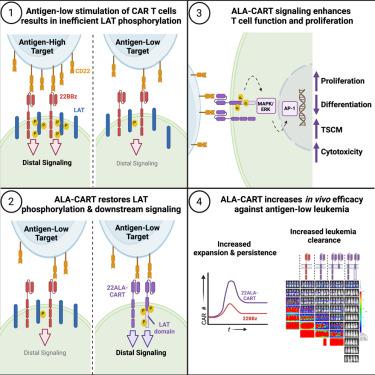Restoration of LAT activity improves CAR T cell sensitivity and persistence in response to antigen-low acute lymphoblastic leukemia
IF 48.8
1区 医学
Q1 CELL BIOLOGY
引用次数: 0
Abstract
Chimeric antigen receptor (CAR) T cells induce responses in patients with relapsed/refractory leukemia; however, long-term efficacy is frequently limited by relapse. The inability to target antigen-low cells is an intrinsic vulnerability of second-generation CAR T cells and underlies most relapses following CD22BBz CAR T cell therapy. Here, we interrogate CD22BBz CAR signaling in response to low antigen and find inefficient phosphorylation of the linker for activation of T cells (LAT) limiting downstream signaling. To overcome this, we designed the adjunctive LAT-activating CAR T cell (ALA-CART) platform, pairing a second-generation CAR with a LAT-CAR incorporating the intracellular domain of LAT. ALA-CART cells demonstrate reduced differentiation during manufacturing and increased LAT phosphorylation, MAPK signaling, and AP-1 activity. ALA-CART cells show improved cytotoxicity, proliferation, persistence, and efficacy against antigen-low leukemias that were refractory to clinically active CD22BBz CAR T cells. Restoration of LAT signaling through the ALA-CART platform represents a promising strategy for overcoming multiple mechanisms of CAR T cell failure.

LAT活性的恢复提高了CAR - T细胞对低抗原急性淋巴细胞白血病的敏感性和持久性
嵌合抗原受体(CAR) T细胞诱导复发/难治性白血病患者的反应然而,长期疗效经常受到复发的限制。无法靶向低抗原细胞是第二代CAR - T细胞的固有脆弱性,也是CD22BBz CAR - T细胞治疗后大多数复发的基础。在这里,我们询问CD22BBz CAR信号对低抗原的反应,并发现T细胞活化连接子(LAT)的低效磷酸化限制了下游信号传导。为了克服这一问题,我们设计了辅助性活化LAT的CAR - T细胞(ALA-CART)平台,将第二代CAR与含有LAT细胞内结构域的LAT-CAR配对。ALA-CART细胞在制造过程中分化减少,LAT磷酸化、MAPK信号和AP-1活性增加。对于临床活性CD22BBz CAR - T细胞难治性的低抗原白血病,ALA-CART细胞显示出更好的细胞毒性、增殖、持久性和疗效。通过ALA-CART平台恢复LAT信号是克服CAR - T细胞衰竭的多种机制的一种有希望的策略。
本文章由计算机程序翻译,如有差异,请以英文原文为准。
求助全文
约1分钟内获得全文
求助全文
来源期刊

Cancer Cell
医学-肿瘤学
CiteScore
55.20
自引率
1.20%
发文量
179
审稿时长
4-8 weeks
期刊介绍:
Cancer Cell is a journal that focuses on promoting major advances in cancer research and oncology. The primary criteria for considering manuscripts are as follows:
Major advances: Manuscripts should provide significant advancements in answering important questions related to naturally occurring cancers.
Translational research: The journal welcomes translational research, which involves the application of basic scientific findings to human health and clinical practice.
Clinical investigations: Cancer Cell is interested in publishing clinical investigations that contribute to establishing new paradigms in the treatment, diagnosis, or prevention of cancers.
Insights into cancer biology: The journal values clinical investigations that provide important insights into cancer biology beyond what has been revealed by preclinical studies.
Mechanism-based proof-of-principle studies: Cancer Cell encourages the publication of mechanism-based proof-of-principle clinical studies, which demonstrate the feasibility of a specific therapeutic approach or diagnostic test.
 求助内容:
求助内容: 应助结果提醒方式:
应助结果提醒方式:


